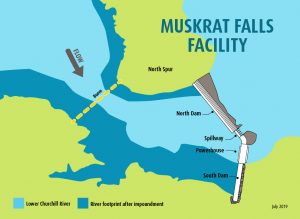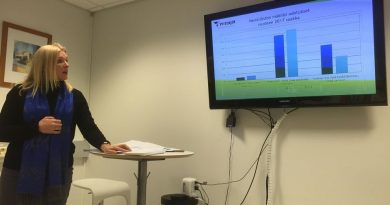Inuit community council in Atlantic Canada signs agreement with Nalcor Energy for $10-million

The community council representing the around 6,000 Inuit in the southern and central region of Labrador has signed an agreement with Nalcor Energy, the company behind a controversial hydroelectric project in Atlantic Canada, that would put funds allotted for wetlands capping, towards health and social programs.
The NunatuKavut Community Council (NCC) made the announcement in a newsletter on their website on Wednesday.
“This straightforward and flexible agreement will enable NCC to deliver additional programs and services that contribute to the overall health and well-being of NunatuKavut Inuit and communities,” the newsletter said.
Controversial week
Indigenous peoples across Labrador have been protesting construction of the controversial Muskrat Falls facility, part of the Lower Churchill Project in the province of Newfoundland and Labrador, for years over concerns it could negatively affect the fish and wildlife they rely on for food.

Nalcor Energy announced earlier this month that the reservoir impoundment at the Muskrat Falls facility, was scheduled to start on August 7.
On Monday, Johannes Lampe, president of Nunatsiavut, the Inuit region of northern Labrador, called on provincial Premier Dwight Ball to halt the flooding over concerns about methylmercury contamination, saying Nalcor Energy had budged funds to cap wetlands but that they had not got environmental approval from the Government of Newfoundland and Labrador.
“We were informed that the application was not processed, yet we have not received any reason as to why,” Lampe said in a news release.
- a compound created when mercury is converted into an organic form
- can occur in flooded areas
- water accelerates the breakdown of vegetation and speeds up the conversation of mercury in the soil into methylmercury
- compound can be easily ingested by fish and other living organisms.
- excess consumption of food with high levels of the compound can be a risk to human health
- covering wetlands with other materials like sand are referred to capping and can mitigate methylmercury creation
Two out of three Indigenous groups sign on to the agreement
On Wednesday, Premier Dwight Ball announced the agreements made between Nalcor Energy and the NunatuKavut Community Council, as well as the Innu Nation, saying they had been made on July 10 and that the government “…agrees with the Indigenous groups on the importance of continued monitoring of methylmercury levels at the Muskrat Falls reservoir, downstream and in Lake Melville.”

On Wednesday, the NCC said it “remains committed to the monitoring and mitigation of potential methylmercury impacts from the Muskrat Falls project’ and that data provided by the province has shown that “…methylmercury levels have, at no time, presented a risk to public health.”
“Once it was confirmed that wetland capping would not proceed, Nalcor offered the budgeted thirty million dollars for equal distribution to Labrador’s three Indigenous groups,” the NCC said in the newsletter. “This money is not compensation or part of any deal on methylmercury.”
The agreement for the NCC’s $10-million share of the funds was signed by Nalcor Energy’s president and CEO Stan Marshall and director of Indigenous affairs Kevin Burt; and by the NCC’s president President Todd Russell and Vice President James Holwell on July 17.
Write to Eilís Quinn at eilis.quinn(at)cbc.ca
Related stories from around the North:
Canada: Inuit leader in Atlantic Canada calls on premier to stop Muskrat Falls flooding, Eye on the Arctic
Finland: The world could transition entirely to cheap, safe renewable energy before 2050: Finnish study, Yle News
Norway: The quest to turn Norway’s Arctic coast into Northern Europe’s wind power hub, The Independent Barents Observer
Russia: Italian firm to build giant wind farm in northwestern Russia, The Independent Barents Observer
Sweden: Sweden’s solar industry sees bright future despite shrinking subsidies, Radio Sweden
United States: Despite winter darkness, solar power might work better in rural Alaska than you’d expect, Alaska Dispatch New



